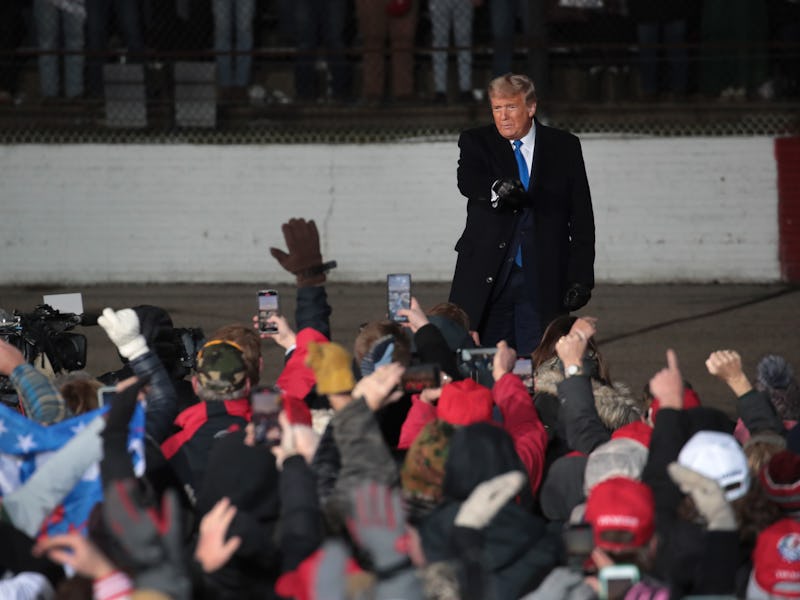If election night is a nailbiter, a new study says Covid-19 could make the difference
The president's supporters are famously loyal. But Covid-19 could have just enough of them questioning past votes.

The coronavirus pandemic has shaken up this year's presidential election in ways no one could have predicted in 2016.
But while Trump may have coronavirus news fatigue ("All you hear is Covid, Covid, Covid, Covid, Covid, Covid, Covid, Covid, Covid, Covid, Covid," he told supporters at one recent rally), both politicians and scientists realize the pandemic could profoundly affect the vote.
As November 3 nears, a new study suggests Covid-19 could put a dent in the President’s most loyal support base. And perhaps surprisingly considering 227,000 Americans have died, the marginal changes in voter intent the study reveals could have an outsized effect on who wins.
The question of Trump supporter loyalty even amidst Covid-19 has been one of much debate.
Small but mighty — Voters across the United States, including Trump supporters from 2016, are likely to associate death rates in their area with the President’s performance in handling the pandemic, according to the study.
The research was published Friday in the journal Science Advances.
In the paper, the scientists find a clear correlation between the most severe Covid locations and support of President Trump. On the whole, “areas with higher COVID-19 fatalities are significantly less likely to support President Trump and other Republican candidates.”
According to study authors and political scientists Christopher Warshaw, Lynn Vavreck, and Ryan Baxter-King, the “number of local fatalities due to COVID-19 appears to be at least as important as the local economy in Americans’ evaluations of their leaders.”
By surveying different regions across the U.S., the researchers discovered how large an impact coronavirus has on support for Trump depends on how badly affected the area was by Covid-19.
They asked respondents about whether they approved of Trump's performance, if they would support Trump or Biden in the election, and how they voted in elections for the Senate and House of Congress.
They then synced up state-level Covid-19 fatalities and rates of infection over thirty days, and feelings regarding the President.
If in the thirty days before being surveyed a county had seen a doubling of its Covid-related deaths, it lead to a “roughly 0.19% reduction in President Trump’s approval rating.” If the fatalities have been even worse, doubling at the state level, that tragedy lead to “a 0.5% reduction in the president’s approval.”
Less than a percentage point of difference might not seem much. But it actually matters to Trump a lot.
Feeling blue — Daily analysis by the New York Times shows that most of the states currently facing the worst Covid deaths are solidly conservative areas. Other states, like Wisconsin, are considered swing states — it is in these swing states that these results matter.
Wisconsin is a case in point. A recent FiveThirtyEight report on a Marquet Law poll finds Biden is “clearly favored” to win there. This result offers further data to back up the study. IN 2016, President Trump won Wisconsin — opponent Hillary Clinton would later recall as a result that caught her by “surprise.” Polls at the time predicted Clinton winning by a small margin — but the 2020 version of the same poll and others show higher numbers for Biden.
Wisconsin has been the site of numerous Covid-related protests.
Coronavirus seems to be a big part of the reason why more Wisconsinites are swinging towards the Democrats. Wisconsin voters support Trump’s handling of the economy by a razor-thin majority of 51 percent, according to the Marquette poll, but when it comes to coronavirus it’s a different story. Only 40 percent of the state supports the President’s handling of the pandemic.
On March 18, as the nation was beginning to come to terms with coronavirus, President Trump referred to the fight against pandemic as a “war.” Now, the researchers say the public is holding him accountable in a similar fashion.
“Just as the public penalizes the president for casualties during wars, the public is penalizing the president and other members of his party for local fatalities during the pandemic,” the study authors write.
When Trump won Wisconsin in 2016, it was by a thin margin of 1,405,284 votes to Clinton's 1,382,536. That comes down to 47.22 percent of the vote versus Clinton’s 46.55 percent, or a 0.77 percent difference. If the state looks like it hangs in the balance on election night this year, the pandemic may predict the outcome.
Abstract: Between early March and 1 August 2020, COVID-19 took the lives of more than 150,000 Americans. Here, we examine the political consequences of the COVID-19 epidemic using granular data on COVID-19 fatalities and the attitudes of the American public. We find that COVID-19 has led to substantial damage for President Trump and other Republican candidates. States and local areas with higher levels of COVID-19 fatalities are less likely to support President Trump and Republican candidates for House and Senate. Our results show that President Trump and other Republican candidates would benefit electorally from a reduction in COVID-19 fatalities. This implies that a greater emphasis on social distancing, masks, and other mitigation strategies would benefit the president and his allies.